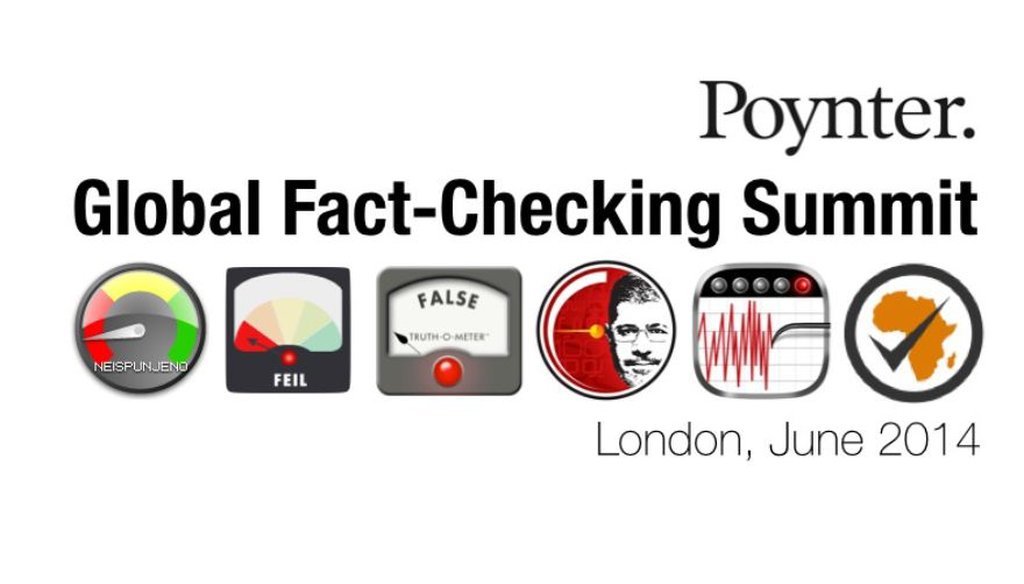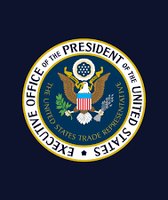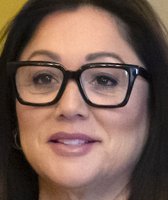Stand up for the facts!
Our only agenda is to publish the truth so you can be an informed participant in democracy.
We need your help.
I would like to contribute

The Poynter Institute hosted the first Global Fact-checking Summit in London.
Editor's note: PolitiFact journalists recently attended the Global Fact-Checking Summit, which was held on June 9 and 10, 2014, in London. Neil Brown, editor of the Tampa Bay Times (the Florida newspaper that owns PolitiFact) delivered the keynote address. The column below is an edited version of his remarks.
We created PolitiFact seven years ago, and in that time, we’ve come to some essential understandings about fact-checking and the fact-checking movement.
1. Fact-checking is here to stay.
Fact-checking is not a fad. Fact-checking is not a novelty. It is absolutely here to stay.
Obviously, to me, the No. 1 example of that is this gathering, which I would call a gathering of true believers -- many whom are courageously working under difficult circumstances -- true believers who are here to learn how to do more fact-checking, how to do it better, and how to reach more people. So how about a round of applause for you all for being here.
Sign up for PolitiFact texts
At PolitiFact, we are reminded of our reach and importance every day as we spread this mantra: Words matter. What a politician says matters. What the government says matters. And when they make a promise or a claim, fact-checking journalists will check it out.
Politicians everywhere are changing their rhetoric in response to this movement. Our reporters get their phone calls returned. The political staff starts working the refs; they want us to publish a ruling that supports what they think. We are starting to see that they change their talking points to mitigate their bosses’ exaggerations.
Of course, when they agree with us, they praise us like crazy. When they disagree with us, they deride us like crazy. We are never ignored.
U.S. Sen. Marco Rubio, often mentioned as a future presidential candidate, on more than one occasion has said during his public comments, "Now wait. I don’t want to get ‘PolitiFacted’ here!"
We have become a verb! That’s how you know we’re here to stay.
PolitiFact has partnerships with eight newsrooms around the United States. We have partnerships with Hearst TV, so we are on 25 television stations in the United States. Our "Beyond the Truth-O-Meter" feature links to the work of fellow travelers like FactCheck.org and Glenn Kessler of the Washington Post. And there are TV stations and small newspapers individually doing fact-checking everywhere, sometimes with small staffs and very frugal operations.
We are here to stay because we meet the definition of innovation -- filling an unmet need. And consumers do need our information, they want it, and they are responding to it. My belief after seven years is this is special, and this form of journalism is here to stay. We all should be very proud of it.
2. Independence is everything -- independence is key to our success.
The Tampa Bay Times recently published an article about a group called American Bridge. The group supports Democratic candidates; it does not disclose where it gets its money. But it has a paid staff of 42 people following candidates it opposes all over the country, taking videos of them and researching everything written about them … So far the group has collected 54,000 video clips -- many of which will undoubtedly find their way into political campaign ads.
We asked the Republicans what they think about it. They don't object: They have their own organizations trying to do the exact same thing.
Will any of these opposition research efforts be presented objectively to the consumers of political speech or information -- the voters? Can we count on the campaigns or the ad makers to present their research accurately and in full context? Of course not -- that’s not their job.
The manufacturing of truth has become an industry. That’s where we come in -- to provide independent analysis of that manufactured truth. Our job is to look at this material and to provide consumers some understanding of its veracity.
But we can’t succeed if we are not vigilant about being independent. In a very polarized society, independence is our lifeline, it is the key to our credibility.
Whether it is our funding sources, whether it is hiring journalists who are free of bias, whether it is our commitment to the craft of editing to make sure that we present this information as independent, whether it is reporting with enough independent, credible sources to defend our fact-checking rulings -- our job is to show that we offer something extremely valuable: independent judgment.
3. Don't fear the half truths, but don’t hide behind half truths, either.
Our fact-checking sites use a lot of ratings. The most frustrating, even unsatisfying, rating is "Half True." But let’s face it, it is actually a gray world out there. And in fact, the most frequent corruption of facts comes when politicians and pundits or others take a gray, complicated situation and paint it as black-or-white. I’m all for taking a stand in our rulings and calling people out for their misstatements. But let’s not be afraid to acknowledge when the reality is that the statement is partly true.
Politicians, government officials, pundits -- they are all getting better at this game because the fact-check journalists are around. They are getting good at finding ways to make sure that at least some of what they say has a nugget of truth.
The price of our success with fact-check journalism is that there will be more Half Trues. The better we do our job, the more difficult our job is going to get.
That said, we must not hide behind half-truths. We must not fall victim to false equivalencies or false balance. We must do our reporting and determine our rulings. Over time, the credibility of our sites will stand up if our reporting is rigorous, independent and fair. But searching for balance out of fear of backlash will undermine the integrity of our work.
And one other caution: We should not be a movement of nitpickers. Let’s pick the stories we do well. Sometimes people make mistakes. Let’s keep the bar high for fact-checking based on the consequence of the statement. And also, there’s a place in our political life for oratory, eloquence, words that inspire people. We won’t let people get away with unsupported claims. But let’s not be an organization of joy killers who don’t understand the power of speech to move people. Political eloquence has a place. We should respect it.
4. We can’t judge our success by metrics alone.
I believe our work is noble. Hence numbers cannot be the only measure of success.
Our Web traffic is growing, there is continued growth in our unique visitors; our social media shares continue to soar. We have expanded our partnerships. More journalists are working together with policymakers. There are numerically more people doing fact-check journalism then there were before.
But the cause of fact-checking is ultimately about putting power in the hands of citizens. Fact-checking gives citizens the power to participate in their public lives -- the power to exercise their most important civil right -- the ability to decide for themselves.
Think about it: Candidates, political parties, super PACs, cable TV and radio shows, partisan bloggers and websites -- they all spend millions of dollars in order to shape what people believe. As I mentioned -- they manufacture truth to suit their aims.
There are no question-and-answer sessions after you watch a campaign ad, there are no meaningful disclosures of where the information comes from.
The politicians' strategy is clear: Say something strongly and frequently enough, and perhaps it will be accepted as truth.
But thanks to fact-checking journalism, citizens -- consumers -- have their own set of tools to judge political speech.
There is often no metric to reflect that. We have to believe that curbing these exaggerations and giving people power to decide for themselves goes beyond empirical and quantifiable data. It is at the heart of independent journalism and makes ours a truly a noble cause.
5. Fact-checking has been good for politics and democracy, but it’s been vitally important for journalism itself.
The technology revolution and the global recession have brought about change and fragmentation in traditional media. Thanks to the Internet, consumers are able to customize their own information gathering. Yet it is the cacophony and chaos of information on that Internet that has made our independent fact-checking operations both more doable and more important than ever for the very industry that created it.
The beauty of fact-checking is that it’s creative, it’s got databases, and it combines the power of new media with old fashioned shoe-leather reporting to establish something strong and powerful.
In that way, fact-checking sites have brought a new relevance to journalism at a time of great upheaval. Yes, we’ve acknowledged that fact-checking is what journalists have always done in some way or another. That said, fact-checking has meant something appealing and relevant to new audiences -- and that is good for journalism.
In closing, I’d like to share with you an experience I had last month. I was lucky enough to attend the luncheon awarding Pulitzer Prizes in New York -- which honors great work (we won one, as did the Guardian and many others). The chairman of the Pulitzer board, Professor Danielle Allen, a political theorist, gave a great speech.
Professor Allen discussed the Declaration of Independence, the very document that founded the American system.
She noted that the authors presented their bill of particulars against the King of Britain with these words: "To prove this, let facts be submitted to a candid world."
In ways that I think have resonance to all of you at this summit, Professor Allen, speaking to the Pulitzer gathering, elaborated on this lovely and little-discussed phrase, "a candid world":
"So what is a candid world? This is the core idea of democracy. Anybody and everybody can take part in analyzing and interpreting the shape and meaning of our world, divining the currents that are evident in the course of events. Anybody and everybody can use their findings together with good arguments to forge the collective decisions that will provide our best bridge to a decent future.
"The power of your work, an article, an essay, a photograph, a poem or a book, emanates from your philanthropic stance toward your audience, indeed toward humankind.
"You believe that we, your readers, have the capacity to assimilate, to respond to, and to judge a picture of the world. You too call out to a candid world."
This is what we fact-checkers are about, some of us working in very difficult circumstances and using great creativity to bring about a candid world. With independence and dedication to our craft, let us continue that great work.
Our Sources
Keynote address.























